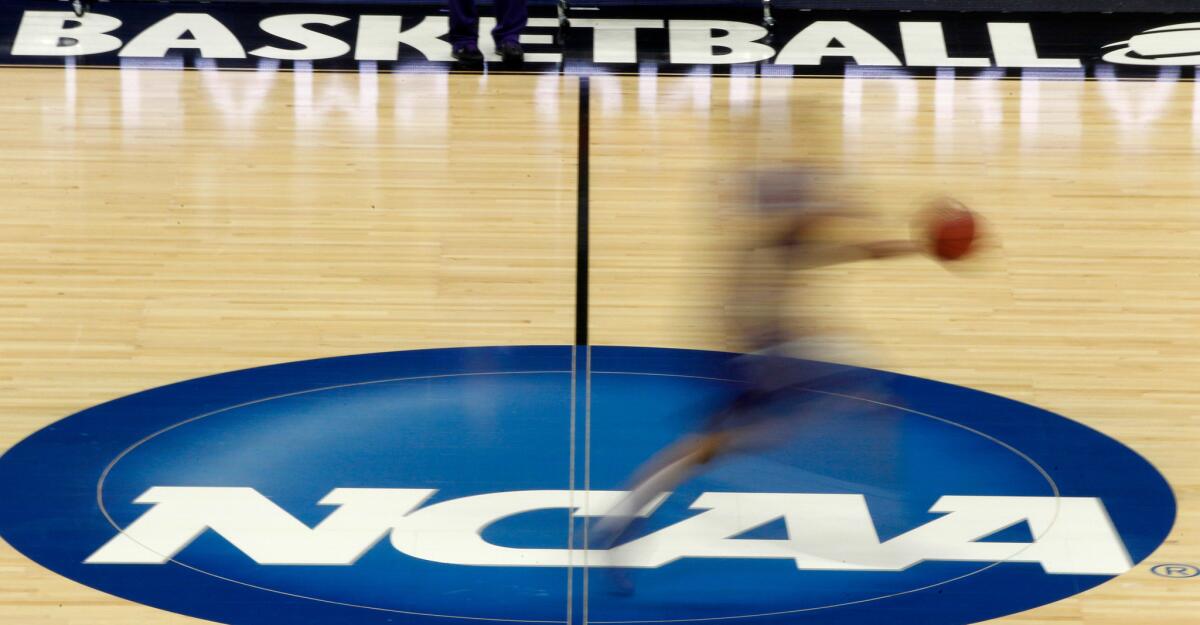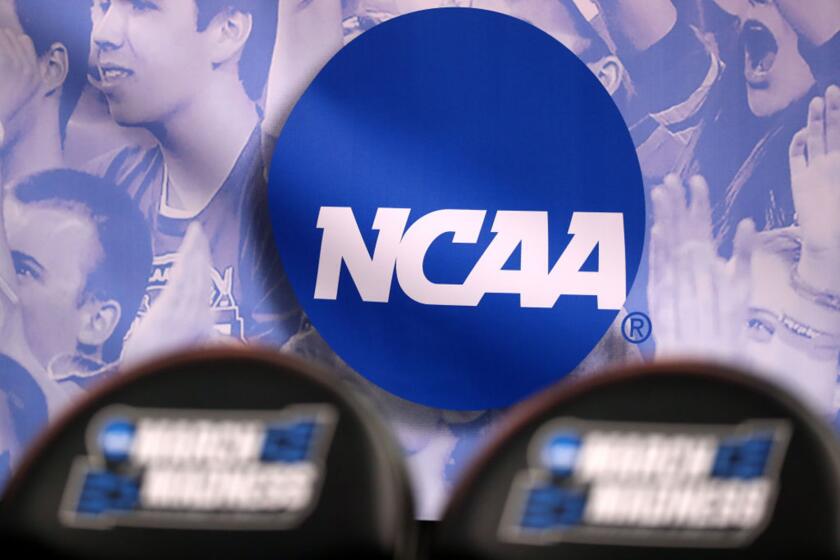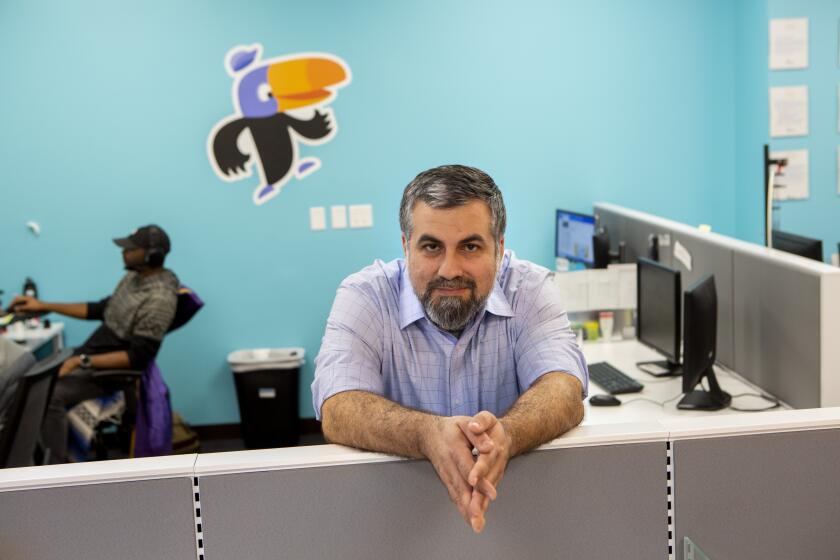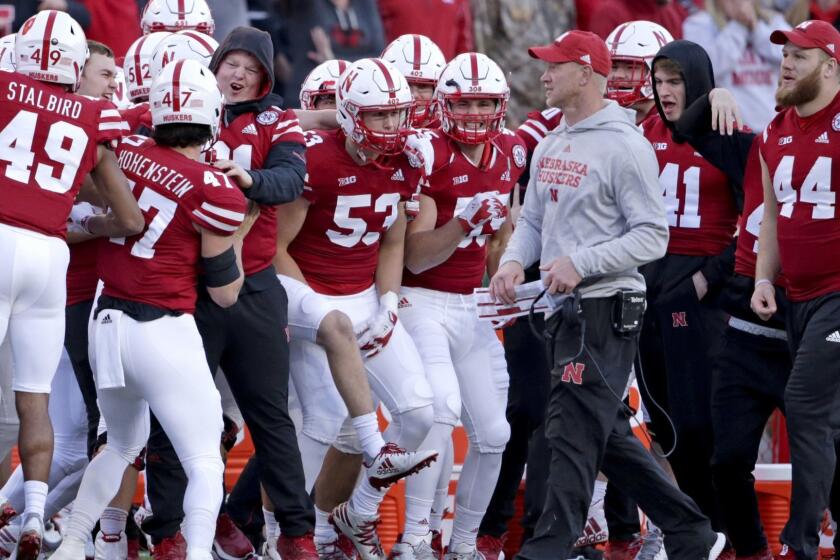NCAA Board of Governors backs name, image and likeness compensation plan

- Share via
The NCAA Board of Governors continued to march down the path to modernization of its rules on name, image and likeness, announcing Wednesday morning support for changes that would allow college athletes to receive compensation for third-party endorsements, social media influencing and personal appearances such as autograph signings.
But college sports’ governing body also made it clear that college athletes will not be using their NILs in a free market.
The NCAA’s three divisions are expected to adopt new rules by January 2021 to take effect at the start of the 2021-22 academic year. Many questions remain about the exact wording of the new bylaws. What is certain is there will be significant “guardrails” recommended by the NCAA’s Federal/State Legislation Working Group, which include:
The NCAA Division I Council group will meet as originally planned in late April to push legislation forward on name-image-likeness issue despite the coronavirus pandemic.
• Regulation of payments by an undetermined body that ensures: transparency by the athlete, third party and institution which shows a “genuine” transaction and not “disguised form of pay for athletics participation”; schools or boosters are not using NIL opportunities as a recruiting inducement, and; that payments are consistent with what is considered to be fair market value for the service in question.
• Regulation of agents and professional representation hired by athletes.
• Prohibition of schools and conferences to play a role in an athlete’s NIL activities, including allowing the student to use conference and school logos, trademarks or other intellectual property in any endorsement.
• Prohibition of a school to pay an athlete directly for NIL activities, keeping with the NCAA’s principle that athletes are students, not employees.
“We need to make sure we provide the protections necessary so they can do it with integrity and in the right way and ultimately not be taken advantage of,” said Ohio State athletic director Gene Smith, co-chair of the NCAA’s working group.
The NCAA said it would need congressional help with “potential challenges to modernizing rules posed by outside legal and legislative factors that could significantly undermine the NCAA’s ability to take meaningful action.”
StudentPlayer.com is a website that employs crowdfunding techniques to connect college athletes with sponsorship opportunities available at schools.
The NCAA will ask Congress to ensure federal preemption over the 30-plus state NIL laws that are now at various stages in the legislative process and to establish a “safe harbor” for the NCAA, providing an antitrust exemption to protect the association against future litigation.
In California, Senate Bill 206, the Fair Pay to Play Act, was signed into law in late September, making it the first state to allow college athletes to profit from the use of their NIL, starting in 2023. SB 206 put no limits on the amount of money players can earn.
While Smith said Wednesday that the NCAA does not plan to establish an earnings “cap,” the organization will devise standards for proving transactions are legitimate and are not inflated by booster manipulation of NIL opportunities.
“The ability of students to freely choose the school that best fits their academic and athletics aspirations is one of the defining features of America’s model of intercollegiate athletics,” the working group’s report stated. “But one result of this freedom is the possibility that students will place undue emphasis on potential NIL opportunities when selecting their schools, to the potential detriment of their academic and athletics careers, and to the potential detriment of fair competition between NCAA members.”
The University of Nebraska will partner with Opendorse to help student athletes monetize their names, images and likenesses, especially on social media.
California state Sen. Nancy Skinner (D-Berkeley), who co-authored SB 206, applauded the NCAA for taking a “step in the right direction.”
“The devil will be in the details,” Skinner said in a statement. “Yet no matter how you cut it, this represents a landmark change. A year ago, no one would have expected the NCAA to move definitively toward giving college athletes their NIL rights. California launched a tidal wave.
“I urge states to press forward with their plans and keep the pressure on the NCAA. Pressure from states and the public will help ensure the NCAA does the right thing — and crosses the finish line to fully give college athletes the same rights that all other Americans enjoy.”
More to Read
Go beyond the scoreboard
Get the latest on L.A.'s teams in the daily Sports Report newsletter.
You may occasionally receive promotional content from the Los Angeles Times.














